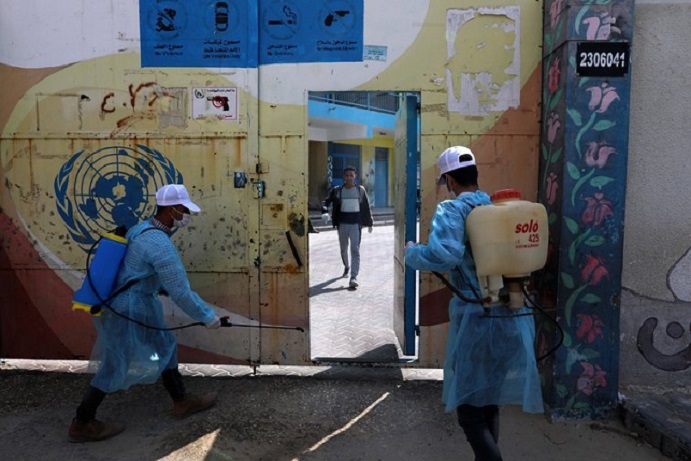
Open Democracy / 21 April 2020
The coronavirus outbreak exposes the fundamental inhumanity of US foreign policy in the Middle East.
Despite widespread outcry to alter U.S. foreign policy in recent weeks, including letters on Iran and Gaza in the House and Senate, the Trump administration has largely stayed its course. Among other policy flaws, the coronavirus outbreak exposes the fundamental inhumanity of US foreign policy in the Middle East.
The US continues to utilize or support policies of collective punishment, now only exacerbated by the pandemic. Debilitating sanctions on Iran that ignore the outcry of multiple human rights and humanitarian groups is just one example of what must change.
The US has also suspended all humanitarian aid to Palestine and Palestine refugees over the past two years, while maintaining complicity with human rights abuses by Israel, with some legislators even working to subvert a case against Israel in the International Criminal Court (ICC), as well as continuing to subsidize the Israeli military to the tune of three billion dollars a year despite Israel’s occupation of the West Bank and blockade on the Gaza Strip.
Sanctions already face critique as an inhumane tactic of international bullying between countries with dramatic asymmetries in power and resources, implemented often exclusively against countries of the Global South. Regarding Iran, a 2018 Human Rights Watch report found that US sanctions were “severely limiting Iranian companies and hospitals from purchasing essential medicines and medical equipment.” Today, in the midst of the COVID-19 outbreak, the sanctions’ effects are catastrophic.
An Iranian health official announced last month that every ten minutes, COVID-19 had killed another Iranian, and within an hour, infected 50 more people. Activists called for a 120-day freeze on sanctions to allow Iran to fight COVID-19 with full force. While the sanctions will continue to hurt Iranian civilians beyond this time period, a foreign policy that cannot adjust to this global pandemic threatens any semblance of adherence to international law and human rights, as defined by either the Geneva Conventions or the UN Declaration of Human Rights. Such concerns have prompted some US policymakers to attempt a change to US foreign policy at this critical time.
By mid-March, Representative Ilhan Omar (D-MN) renewed a call to end sanctions on Iran, noting that they were worsening an especially deadly coronavirus outbreak, with repercussions in the region and around the world. Since then, many Democratic legislators joined her in letters to Secretary of State Mike Pompeo urging sanctions relief on Iran, followed by former Vice President Joe Biden. The New York Times editorial board also supported lifting sanctions on Iran, citing the dramatic humanitarian impact. Yet, the response from the Trump administration, in late March, was to impose additional sanctions on Iran, despite later saying they are constantly re-evaluating and may reconsider their approach. By then, Iranian President Hassan Rouhani said such re-consideration comes too late.
In the Gaza Strip, Israel’s 13-year-long blockade threatens to devastate the dense population center. There is a dramatic shortage of basic resources as Israel tightly controls Gaza’s airspace, coast, and borders, rationing supplies of energy, food, medical equipment and other products. Gazans have limited hours of electricity each day, increasingly less potable water, and widespread poverty, with unemployment at about 70%. In 2012, the UN declared that the Israeli blockade of Gaza would leave it “unlivable” by 2020. We have now reached that fateful year.
At the time of writing, Gaza has confirmed 15 cases of coronavirus. If the virus were to spread like it has elsewhere, Gaza’s health system would have capacity for just the first 100 cases in a month. This deadly pandemic, and Israel’s blockade on Gaza’s 2 million residents, which is supported both rhetorically and materially by the US, is a recipe for passive genocide.
Moreover, the Trump administration, much like its sanctions on Iran, has deprived the UN Relief and Works Agency (UNRWA), a major source of humanitarian aid in Gaza, of all US aid since 2018. As UNRWA’s largest funder, with donations amounting to 70% of Gaza’s emergency care budget, this cut of US funds dramatically reduced the agency’s capacity to operate health clinics, emergency assistance operations, schools, and other basic services. In response to the cuts, UNRWA was forced to lay off over 1000 aid workers in Gaza, many of them parents. One aid worker who lost his job was the sole breadwinner for his two handicapped children, as well as 20 immediate or extended family members; he attempted suicide by setting himself on fire after losing his job, and was fortunately saved by passers-by.
Beyond staff cuts, UNRWA was forced to cut back mental health and social-emotional learning programs for Gazan children, many of whom have now lived through three wars in their lifetimes. Importantly, all three of those wars were underwritten by US taxpayers and affirmed by US legislators.
In the midst of the global pandemic, the continued denial of aid to UNRWA is nothing short of cruel and inhumane. The recently-approved $5-million-dollar US grant to the West Bank and Gaza is hardly a gesture of support compared to the $360 million in aid denied now for two years. When the dust settles, the image of US foreign policy that remains is that of cold-hearted tactics of collective punishment amidst the worst pandemic in modern history.
Americans and US lawmakers alike who wish to put “US interests” above humanitarian demands must consider whether it is truly within US interests to disregard even affectations of humanity in a foreign policy agenda. When it comes to a global pandemic, any country is only as strong as the most vulnerable, and this principle extends to the US’s neighbours around the world, allies or not. It is time for the US to change its tactics and become a good faith player internationally. It is time to end sanctions on Iran and restore aid to UNRWA, to end the blockade of Gaza—at least throughout the course of this deadly pandemic.
Halah Ahmad is the U.S. Policy Fellow for Al-Shabaka, a transnational think tank focused on Palestinian economic and political affairs; she holds a BA from Harvard and an MPP from the University of Cambridge












